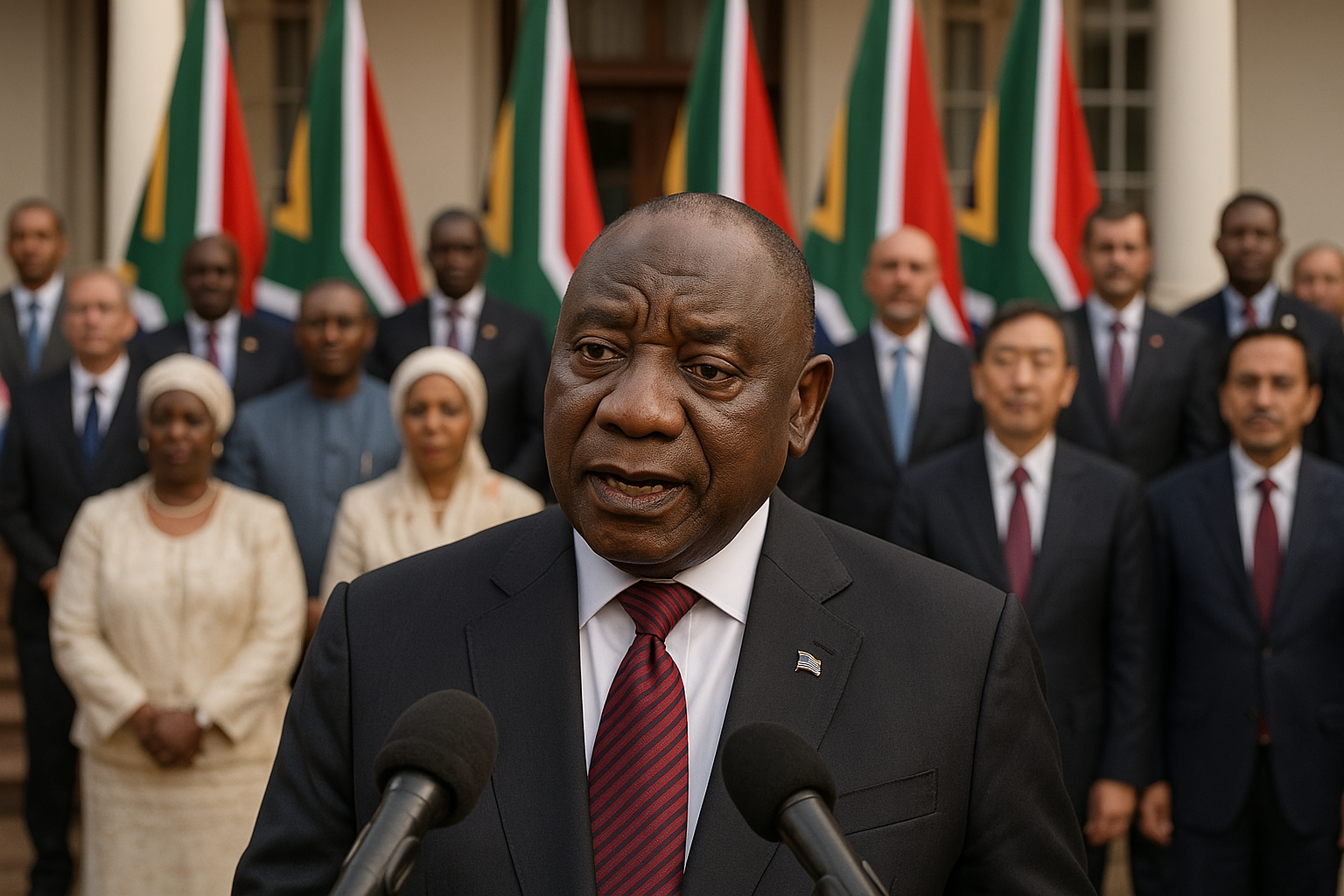Ramaphosa Launches National Dialogue to Tackle SA’s Deep-Rooted Challenges
Speaking candidly to the newly assembled group, President Ramaphosa acknowledged that while democracy has transformed South African society, the structural scars of apartheid continue to haunt millions.

- Country:
- South Africa
In a decisive move aimed at confronting South Africa’s most entrenched social and economic challenges, President Cyril Ramaphosa has formally convened the inaugural meeting of the Eminent Persons Group, marking the launch of a wide-reaching National Dialogue intended to reshape the country’s developmental trajectory 31 years into democracy.
The meeting, held at the historic Union Buildings in Pretoria, signals the beginning of a citizen-led process aimed at addressing the festering inequalities, economic stagnation, institutional erosion, and rising public disillusionment that have come to define South Africa’s post-apartheid landscape.
“The Vestiges of Our Apartheid Past Remain”
Speaking candidly to the newly assembled group, President Ramaphosa acknowledged that while democracy has transformed South African society, the structural scars of apartheid continue to haunt millions.
“There can be no doubt that we have begun to transform our society and our economy. And yet, the vestiges of our apartheid past remain,” the President said.
He pointed to rising unemployment, persistent poverty, and growing inequality as critical challenges that must be tackled with urgency. South Africa’s unemployment rate remains among the highest globally, particularly among the youth, and economic growth has stagnated, exacerbating public frustration.
The President also acknowledged a deterioration in governance, citing service delivery failures, corruption, and a lack of accountability as major impediments to progress.
Democratic Apathy: A Warning Sign
President Ramaphosa expressed concern over a declining faith in democratic institutions, as demonstrated by historic low voter turnout in the May 2024 general elections.
“We have seen an increasing disengagement by many people from the democratic process,” he warned, suggesting that political apathy is both a symptom and a cause of deeper societal fractures.
A Citizen-Led National Dialogue: “Not Government-Directed”
The President made it clear that this national dialogue is not a government-driven initiative, but rather a collective, inclusive process that must be owned by the people of South Africa.
“It cannot be partisan. It cannot favour one group or perspective over any other,” he stated emphatically.
He described the initiative as a strategic effort to build a social compact, setting out clear commitments from government, political parties, civil society, business, and the public.
Importantly, the dialogue is designed to complement—not replace—existing democratic institutions like Parliament, the courts, and local governance mechanisms.
Eminent Persons Group: Guardians, Not Cheerleaders
To safeguard the credibility and inclusiveness of the process, President Ramaphosa announced the establishment of an Eminent Persons Group, a carefully selected assembly of respected leaders from various sectors.
“We are asking you, Eminent Persons, to be champions of the national dialogue, not cheerleaders,” he said.
The group’s primary responsibility will be to:
-
Ensure transparency and inclusivity
-
Identify attempts at misinformation or manipulation
-
Course-correct when the process strays from its intended purpose
-
Engage critically and independently with the outcomes
National Convention Scheduled for August
The President also announced that the first National Convention will be held in August 2025, where a collective national vision is expected to emerge from dialogue with diverse voices and sectors of society.
This platform will provide an opportunity for:
-
Community-based organizations
-
Faith groups
-
Youth and student bodies
-
Labour unions
-
Private sector representatives
-
Academic institutions
-
Political stakeholders
to come together and co-create a shared path forward for the nation.
“South Africans want to be heard. They want to be included in whatever process is meant to improve their lives,” said the President.
Confronting Scepticism and Misrepresentation
Acknowledging that the process has already faced scepticism, misinformation, and political resistance, President Ramaphosa called on the public to remain focused.
“We should not fear criticism. We should welcome it,” he urged. “Misinformation about the cost or management of this dialogue should not distract us from the urgent work ahead.”
He appealed for national unity, not uniformity—emphasizing that the strength of the process lies in its ability to engage differing perspectives constructively.
A Call to Rediscover the Spirit of National Consensus
Drawing from South Africa’s history of collaborative problem-solving, the President referenced successful precedents such as:
-
The National Peace Accord
-
The Convention for a Democratic South Africa (CODESA)
-
The drafting of the Constitution
-
And the national response to COVID-19
“Dialoguing is not a new phenomenon to South Africans,” he reminded attendees.
Now, with the nation facing a different kind of crisis—one of social fatigue, institutional decay, and economic exclusion—the National Dialogue aims to rekindle hope and rebuild public trust.
Charting a New Course for South Africa
President Ramaphosa closed the session by reaffirming that the National Dialogue is not a silver bullet, but a critical starting point for reimagining South Africa’s future through inclusive participation and mutual accountability.
“We must build a new consensus. Not through mandates or manifestos, but through conversation, through listening, and through shared responsibility.”
As the country prepares for its first national convention in August, the success of this dialogue—its authenticity, impact, and legacy—will depend on the willingness of every South African to participate, challenge, and contribute.
- READ MORE ON:
- Cyril Ramaphosa
- National Dialogue
- South Africa Democracy
- Eminent Persons Group
- Social Compact
- Inequality
- Economic Reform
- Unemployment
- Voter Apathy
- Inclusive Governance
- BELA Act
- National Convention 2025
- Union Buildings
- Service Delivery
- Political Participation
- Citizen Engagement
- Dialogue for Development










